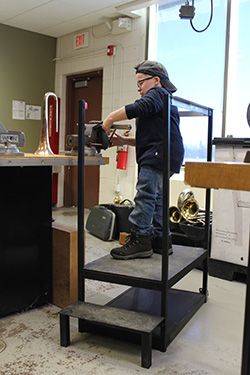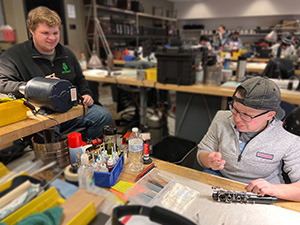Republican-Eagle: Finding a career in Red Wing
Student finds passion in band instrument repair
 Maybe music education just wasn't the right career path for Dakota Nealey. Partway into the music student's third year at Coastal Carolina University near Myrtle Beach, South Carolina, Nealey realized writing curriculum wasn't as fascinating as one might hope.
Maybe music education just wasn't the right career path for Dakota Nealey. Partway into the music student's third year at Coastal Carolina University near Myrtle Beach, South Carolina, Nealey realized writing curriculum wasn't as fascinating as one might hope.
As a trumpet player in high school and college band, Nealey had a natural affinity for band instruments, and the concept of becoming a band instrument repair technician seemed interesting.
"My junior year in college, I was talking to my trumpet professor about setting goals for the coming year and I brought up band instrument repair. He immediately said, 'Red Wing!' I reviewed Minnesota State College Southeast's website, read articles about the college and watched the band instrument repair program's videos," Nealey said, adding, "I was impressed with what I saw online."
But for a person of short stature -- just under 4 feet tall -- it wasn't clear that a career in band instrument repair would be a good choice. And the decision to go all the way to Minnesota for training couldn't be made unless the college could make certain accommodations.
Nealey contacted instructor John Huth at the college, first by email, then by Zoom.
"After talking to Dakota, I got in touch with two of our BIR graduates who work near Myrtle Beach," Huth said. "I wanted Dakota to have the chance to visit a working repair shop and see if it really was viable as a craft."
Band instrument repair instructor Greg Beckwith explained, "Dakota went to a shop before ever coming to us and was observed by seasoned technicians to determine if it was possible to do this kind of work. They said, 'Absolutely yes,' with the right adaptations."
That visit sealed the deal for Nealey to pursue an education in Red Wing. But upon arriving at MSC Southeast, it was apparent that the workbenches and other equipment used by most students in the band instrument repair program weren't going to work.
"For starters, every workbench has a bench motor that is controlled with a foot pedal, which I couldn't reach. We tried putting the foot pedal on a wooden platform, and it kind of worked, but it really wasn't safe," Nealey said. "You really need to have your feet on the floor for this."
College staff, faculty make -- and manufacture -- accommodations
 Enter Dean Richter, a maintenance technician at the college. He cut the wooden legs of a spare guitar program workbench down to the correct size for Nealey, then added a band instrument repair bench top.
Enter Dean Richter, a maintenance technician at the college. He cut the wooden legs of a spare guitar program workbench down to the correct size for Nealey, then added a band instrument repair bench top.
Now the foot pedal was well within reach and Nealey had the same table surface area to work on as the other students. The desk was placed in the front row of the classroom, for the best sight lines to the instructor and the video screen used for demonstrations.
Another challenge was utilizing the buffers, lathes, mills and other large machinery that cannot be moved or lowered. Welding instructor Mike Ford sprang into action to build a work platform that Nealey could use to reach and use the equipment safely.
Ford said, "At the beginning of the semester, we went around campus looking for materials we could use to build something custom. We started with a storage cabinet, a wheeled pushcart, and some loose odds and ends -- like steel bars and aluminum for the handrails."
Ford could visualize the outcome and make it happen.
"I'm like a sculptor looking at a block of stone. Give me an idea, and I can look at a pile of steel and say, 'OK, if I use this and that, I can make it,'" he said, adding, "That's why I do this at all, it's fun, it's creative, and best of all, it's helping out a student."
The finished work platform can be moved around on its wheels as needed, and once it's in place, it's rock-solid and safe.
"We usually keep it in the machine shop with the lathes, sanders and all that. I use almost every day when working on brass instruments," Nealey said.
"The cool part about making these accommodations is that instructors observe what is and isn't going well -- and Dakota comes to us and says, 'This is what I'm experiencing' -- and we address it," John Huth said. "Dakota is a very persistent, determined individual and that's what makes it work."
Greg Beckwith added, "I think it's wonderful to see someone who has a passion, who obviously can do band instrument repair, but just needs the right accommodations to make it possible. I'm really proud of how the team at Southeast made the custom equipment that Dakota needs."